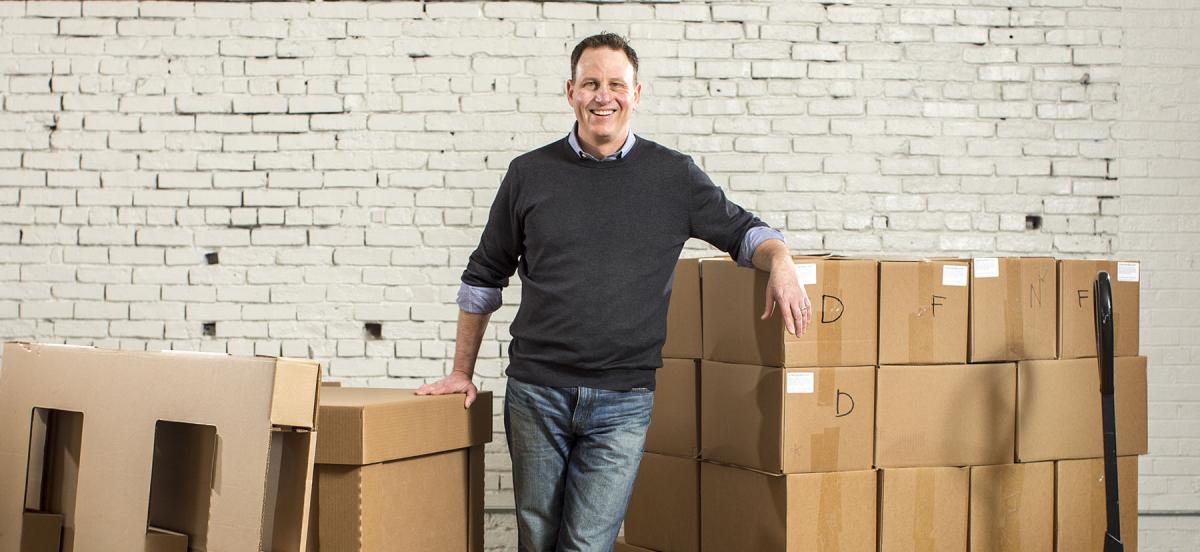Changing the Pallet

Adam M. Pener '95 with his company's cardboard pallets that cut down on costs, waste, and emissions. Photo by John Valls.
Details
What began as a business opportunity for Adam M. Pener ’95 has become a mission: to shift the shipping industry from wood pallets to those made from environmentally friendly corrugated cardboard.
It’s hard to imagine corrugated cardboard pallets evoking much passion. But for Adam M. Pener ’95, the environmentally friendly mode of shipping has become a consuming cause.
“I got into this as a businessman,” says Pener, 44, president of Green Ox Pallet Technology with headquarters in Denver, Colo. “But I’ve become a reluctant crusader of sorts. Because sometimes, that’s what it takes.”
Founded in 2009, the company makes pallets to transport stuff in trucks and planes or store in warehouses—but instead of the traditional wood, it uses corrugated cardboard. Initially recruited as chief operating officer, Pener cultivated investors. Along the way, the Portland, Ore., outdoorsman who majored in political science at Haverford (and got a master’s in international economics from George Washington University) grew ever more enthusiastic for Green Ox’s products and mission.
“My biggest goal in this world,” he says, “is to see corrugated pallets do their job, which is to save money and reduce emissions.”
On average, corrugated pallets, which are plenty strong, weigh 40 pounds less than wood and take up less space, Pener says. That means reduced dead weight and increased product per truck. And that, he argues, adds up to fewer trucks on the highways, which means less emissions and less wear and tear on infrastructure. The pallets are also completely recyclable, creating zero waste. (Corrugated, however, is not as durable outdoors and cannot hold very heavy items.)
Among the companies to fully embrace the concept is IKEA, which switched its entire supply chain to corrugated pallets in 2012. Since then, the international furniture retailer has reportedly reduced its emissions by 300 thousand metric tons, and decreased truck trips by 15 percent.
Pener’s enthusiasm has morphed beyond Green Ox clients and investors to the ambitious goal of massively reducing carbon emissions. In 2015, he started the nonprofit Change the Pallet. It is separate from Green Ox and doesn’t endorse a particular manufacturer. But the two groups share goals. Change the Pallet wants to increase awareness about the benefits of corrugated cardboard and shift an industry wedded to wood. Its ultimate target is to reduce carbon dioxide emissions by “hundreds of millions of metric tons” by 2025, its website states.
Pener has plenty of social justice experience and success. After Haverford, he helped start Conflict Securities Advisory Group. Its research on companies with investments in U.S.-designated terror sponsors, such as Iran, North Korea, and Sudan, aided divestment campaigns, particularly in Sudan, he says.
Pener credits Haverford for sharpening his critical thinking skills and teaching him “to challenge the norm, … to think whether or not you’re being spoon-fed something.”
When corrugated pallets first appeared on the market in the 1970s, he says, they needed to be glued or stapled together at the point of use. That hurt market share. Fast forward to the 2000s. Green Ox created a two-piece, foldable pallet that easily fits together—no glue, no staples. The company, with seven full-time employees, also makes different sizes and shapes. This year, it added the Green Ox & Box, a combination box/pallet for small businesses to ship products.
But upending a $10-billion-a-year pallet industry where wood is king is no easy task. Pener, who has had some doors slammed in his face, spends his days meeting with business executives, making presentations, and proving his point with beta testing in Kenya, Costa Rica, and the United States.
“[Amazon founder Jeff] Bezos disrupted retail,” declares Pener with the conviction of a crusader. “We’ll disrupt transportation.”


